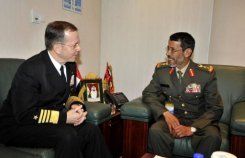 |
| © AFP/WAM-HO |
ABU DHABI (AFP) – Washington’s highest-ranking military officer and its top Middle East diplomat are touring the Gulf this week to reassure allies in oil-rich nations, as bloody uprisings rock the region.
Admiral Mike Mullen, Chairman of the Joint Chiefs of Staff, visited Saudi Arabia, Qatar and the United Arab Emirates this week as part of a tour that was scheduled well before the uprisings.
Members of is entourage said he may also stop in Bahrain — home of the US Fifth Fleet — which has been gripped by a popular revolt challenging the rule of the Sunni dynasty in power for over 200 years.
The top US diplomat for the Middle East Jeffrey Feltman has also embarked on a tour of oil-rich Arab Gulf states Tuesday and is expected to visit Bahrain as well.
The State Department said Feltman would also visit Qatar, Kuwait, Oman and the UEA to press for political and economic reform, saying there was a “critical need to address” such calls for change.
Mullen has said his trip aimed to “reassure, discuss and understand what’s going on” and has called for a peaceful resolution to confrontations between opposition groups and governments in the Arab world.
“This a time of enormous change that needs to be resolved peacefully without violence and leaders have to step forward in that regard,” he said.
Mullen praised the decision of Bahrain’s Crown Prince Salman Ben Hamad Al-Khalifa to hold talks with demonstrators saying “it had relieved a number of leaders (he spoke to during his tour) in terms of easing tensions.”
US President Barack Obama’s chief military adviser has also met with counterparts in the region to convey support from Washington, which also has military bases in Qatar and the United Arab Emirates.
Seven people have been killed in Bahrain since the revolt was unleashed on February 14 in the small Sunni-ruled kingdom with a Shiite majority.
The unrest has bolstered fears that Iran’s Shiite regime will take advantage of the crisis
But Mullen has said he did not see Tehran’s hand behind Manama’s protests.
“Iran, I still believe, is a country that continues to foment instability in the region, take advantage of every opportunity… (but) from my perspective that has not been the principal focus of what happened in Egypt or what happened in Bahrain or any of these other countries,” he said.
About 4,200 US troops are stationed in Bahrain to protect the Gulf’s maritime oil routes supplying US operations in Afghanistan.
Manama and Washington are bound by a 1991 defense pact which stipulates bilateral consultations in cases of security threats against Bahrain, Middle East expert Kenneth Katzman said in a Congress report.
“What could be at stake here is an ability to have forces in the Gulf to reassure our allies… that they will be protected from Iran,” David Aaron, a senior fellow at the RAND Corporation think-tank, told AFP.
Saudi Arabia, irritated by “outside interference” from Washington during the revolt against Egyptian Hosni Mubarak, remains at the heart of US strategy in the region.
From the outbreak of unrest, Riyadh has offered unwavering support to Bahrain, fearing protests could destabilise its oil-rich eastern provinces and agitate the Shiite communities living there, a potential boon for Iran.
“Bahrain is a proxy battleground in the broader geopolitical struggle between Saudi Arabia, the United States and Iran,” says the US firm Stratfor, which specializes in intelligence.
© AFP — Published at Activist Post with license

Be the first to comment on "US tries to reassure Gulf allies shaken by revolts"